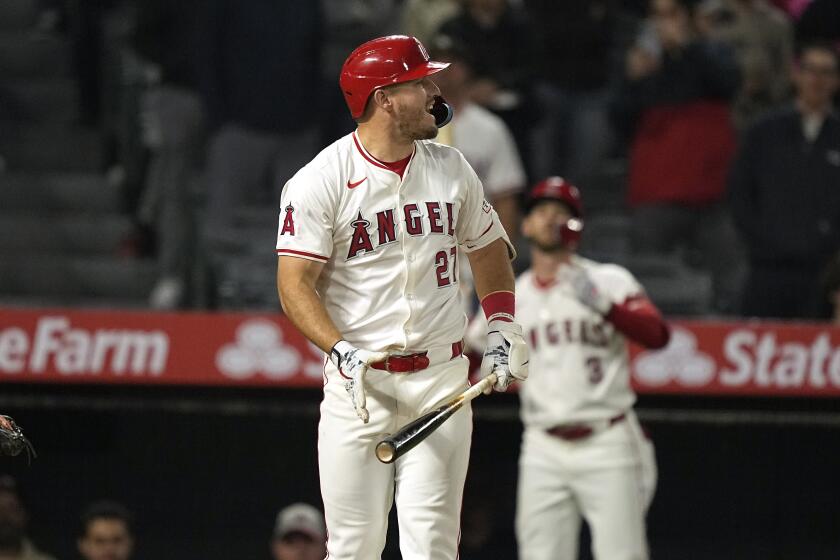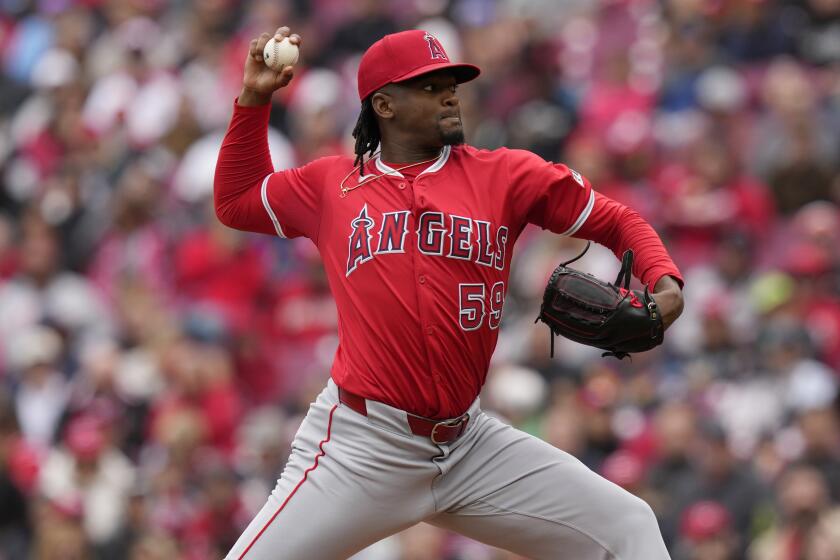Matthews should speak now or forget about finding peace
Gary Matthews Jr. has to realize that the less he says about his alleged link to human growth hormone shipments, the worse it looks.
If we’ve learned one thing the last few years, it’s that choice of words means everything. Jason Giambi apologizes, without even saying what for, and now it’s back to business as usual. But Mark McGwire’s “I’m not here to talk about the past” performance on Capitol Hill led to a smackdown by Hall of Fame voters.
When Matthews’ name came up in news reports of a raid on alleged steroid distributors last week, his response was weak.
The heart of his comments: “We’re gathering information, and I will address the matter again at the appropriate time.”
What information is there for him to gather? It’s his life, he’s been there every day. He knows what he did or didn’t do, so there’s nothing to research. If he never ordered any human growth hormone, or if there was some reason he did, let us know now -- which, by the way, would be an appropriate time.
(And when did gathering information/facts become the mandatory response every time bad news breaks? For example, Tennessee Titans Coach Jeff Fisher, after Pacman Jones’ Vegas adventures, saying that “once we’re able to gather the facts on this one, we’ll be able to address his future and those other types of things.”)
I think we’ve gathered enough information on baseball cheating. Now you have to wonder when -- if ever -- we’ll reach a time when baseball isn’t dogged by performance-enhancing drug headlines. They’re a constant, annoying presence that apparently won’t go away. Kind of like Ryan Seacrest.
Having Matthews’ name thrown into this mix makes it even worse. He isn’t out of the game now, as McGwire or Jose Canseco are. He isn’t disliked anyway, like Barry Bonds. I met Matthews for the first time at the Angels’ Fan Fest last month, and he seemed to be a good guy. He was an anti-Bonds, completely cooperative with reporters. He went on a long, unprompted take on the meaning of fatherhood and how important it was to be there for his son.
Now, instead of merging onto the team as a good clubhouse guy, he’s created a distraction in training camp and put the Angels’ front office on the spot.
By now we should know there is no profile for a suspected performance-enhancing drug user. Big power hitters, scrawny infielders, middle relievers -- they’ve all tested positive or come under scrutiny. It’s part of the game.
Remember how we got to this era of testing and increasingly harsh penalties for the users. It’s because baseball players couldn’t say no.
For the 2003 season, Major League Baseball (still holding to the belief that the problem might not be so bad) started random, anonymous drug testing on a provisional basis. A full-scale program would kick in only if 5% of the tests came back positive. All the players had to do was just act right for a set amount of time. It reminds me of Rodney Dangerfield in “Easy Money.” They couldn’t do it. Not even for a year, even with the incentive of a test-less future where they’d be free to inject away. They passed the 5% threshold and testing for all players started in 2004.
When testing came in, some proclaimed it to be the end of the Steroid Era. How naive. Well, technically, anabolic steroids might be out, but human growth hormone and other performance enhancing drugs are still at the plate, taking their cuts.
What’s scary is how reckless athletes can be with their bodies. Many of these drugs haven’t been around for enough time for doctors to study the long-term effects. The paperback edition of “Game of Shadows” says that in his time with the San Francisco Giants, Bonds grew 10 uniform sizes and 2 1/2 cleat sizes. How’s that for a nice anecdote as Bonds goes after Hank Aaron’s home run record?
So what does baseball do here? Even if Matthews is found to have received drug shipments in 2004, that doesn’t prove he used them. If he did, human growth hormone wasn’t on the banned substances list in 2004.
And even if he were using it today, there still isn’t a simple, reliable test for it that everyone can agree on.
Baseball Commissioner Bud Selig needs more than circumstantial evidence to punish Matthews, or he’ll get overrun by the most powerful union in sports.
Former Arizona Diamondbacks pitcher Jason Grimsley never failed a drug test, but a shipment of HGH was sent to his home and he later admitted to using it. He was suspended, then he retired.
Will Matthews offer an admission? An apology? A plausible explanation that he’s never used performance enhancing drugs?
Whatever he says, he’d better come with something stronger than his initial efforts.
*
J.A. Adande can be reached at j.a.adande@latimes.com. To read more by Adande, go to latimes.com/adandeblog.
More to Read
Go beyond the scoreboard
Get the latest on L.A.'s teams in the daily Sports Report newsletter.
You may occasionally receive promotional content from the Los Angeles Times.






